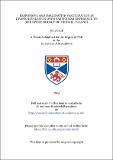Files in this item
Responsive and imaginative participation in divine revelation with particular reference to the epistemology of Michael Polanyi
Item metadata
| dc.contributor.advisor | Hart, Trevor A. | |
| dc.contributor.advisor | Partridge, Michael Francis | |
| dc.contributor.author | Clark, Tony | |
| dc.coverage.spatial | viii, 285 p. | en_US |
| dc.date.accessioned | 2018-05-24T12:25:28Z | |
| dc.date.available | 2018-05-24T12:25:28Z | |
| dc.date.issued | 2005 | |
| dc.identifier.uri | https://hdl.handle.net/10023/13526 | |
| dc.description.abstract | The Christian church proclaims that God has made himself known. It is the task of a doctrine of revelation to offer an account of this claim. In this thesis we take Karl Barth's doctrine of the Word of God as our point of departure. In critical engagement with it we address weaknesses in Barth's work and suggest some corrective strategies. In particular, we deal with his tendency to understate human participation in the event in which God makes himself known. In attempting to develop the doctrine we draw substantially upon the epistemological work of Michael Polanyi, a philosopher who articulated, with considerable clarity, the forms of participation out of which knowledge arises. One of the most innovative aspects of Polanyi's work is his theory of tacit knowledge. In this he demonstrates how our conceptual understanding arises out of our 'indwelling' of knowledge upon which we depend but can articulate only in part, if at all. This knowledge, or 'know-how', is established, in various ways, in and through our participation in life contexts. We reflect upon our participation in some aspects of the ecclesial context, with which we are primarily concerned, including sacramental practice and the place of music in worship. The thesis explores how Polanyi's insights illuminate the task of articulating a doctrine of revelation in which human participation is appropriately acknowledged. The last chapter deals with the question of imagination and makes explicit some themes which have been implicit throughout the thesis. We suggest that our participation in revelation is necessarily imaginative, and that God, in making himself known, appeals to our imagination. The thesis does not seek to draw the themes it explores to a conclusion, but suggests trajectories of reflection in which we can further explore our responsive and imaginative participation in revelation. | en_US |
| dc.language.iso | en | en_US |
| dc.publisher | University of St Andrews | |
| dc.subject.lcc | BT127.3C6 | |
| dc.subject.lcsh | Revelation | en |
| dc.subject.lcsh | Polanyi, Michael, 1891-1976 | en |
| dc.subject.lcsh | Barth, Karl, 1886-1968--Contributions in doctrine of revelation | en |
| dc.title | Responsive and imaginative participation in divine revelation with particular reference to the epistemology of Michael Polanyi | en_US |
| dc.type | Thesis | en_US |
| dc.contributor.sponsor | Sir Richard Stapley Educational Trust | en_US |
| dc.type.qualificationlevel | Doctoral | en_US |
| dc.type.qualificationname | PhD Doctor of Philosophy | en_US |
| dc.publisher.institution | The University of St Andrews | en_US |
This item appears in the following Collection(s)
Items in the St Andrews Research Repository are protected by copyright, with all rights reserved, unless otherwise indicated.

